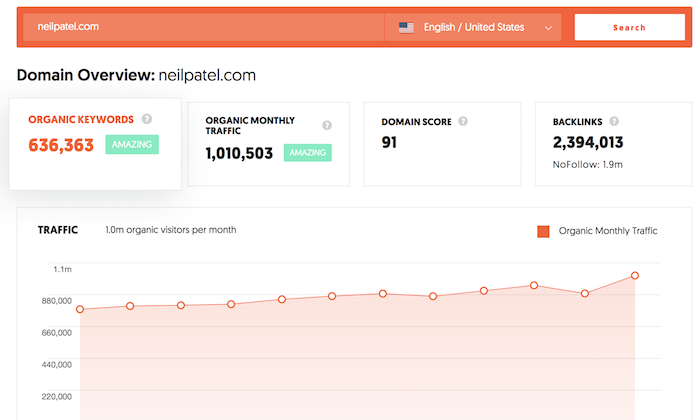
When I started doing SEO on NeilPatel.com I used this advanced formula to rank for 477,000 keywords.
Over time, my traffic started to flatline and I wasn’t ranking for many more keywords, even though I was continually creating more content.
But then I figured out a simple hack that took me from 477,000 keywords to 636,363 keywords as you can see in the image above.
So, what was this hack?
Well, it’s so effective that I just updated Ubersuggest so that includes the hack.
So how did I do it?
When someone does a Google search, what are they typically doing? They are trying to find a solution to their problem, right?
So how can you easily identify these problems people are searching for?
Typically, you want to look for 3 types of keyword phrases:
- Questions – people type in questions because they are looking for answers. And if your product or service helps answer those questions, you’ll see a boost in conversions.
- Comparisons – when someone is searching for comparison keywords such as “MailChimp VS Converkit” there is high buyer intent, even if your company isn’t mentioned in the search phase. (I’ll go into how to leverage this in a bit.)
- Prepositions – when keywords contain a preposition, they tend to be more descriptive. If you aren’t sure what a preposition is, simple prepositions are words like at, for, in, off, on, over, and under. These common prepositions can be used to describe a location, time, or place.
But how do you find these keywords?
Well, I just updated Ubersuggest to now show you questions, comparisons, and prepositions.
Just head over to Ubersuggest and type in a keyword that you want to go after. For this example, I typed in the word “marketing”.
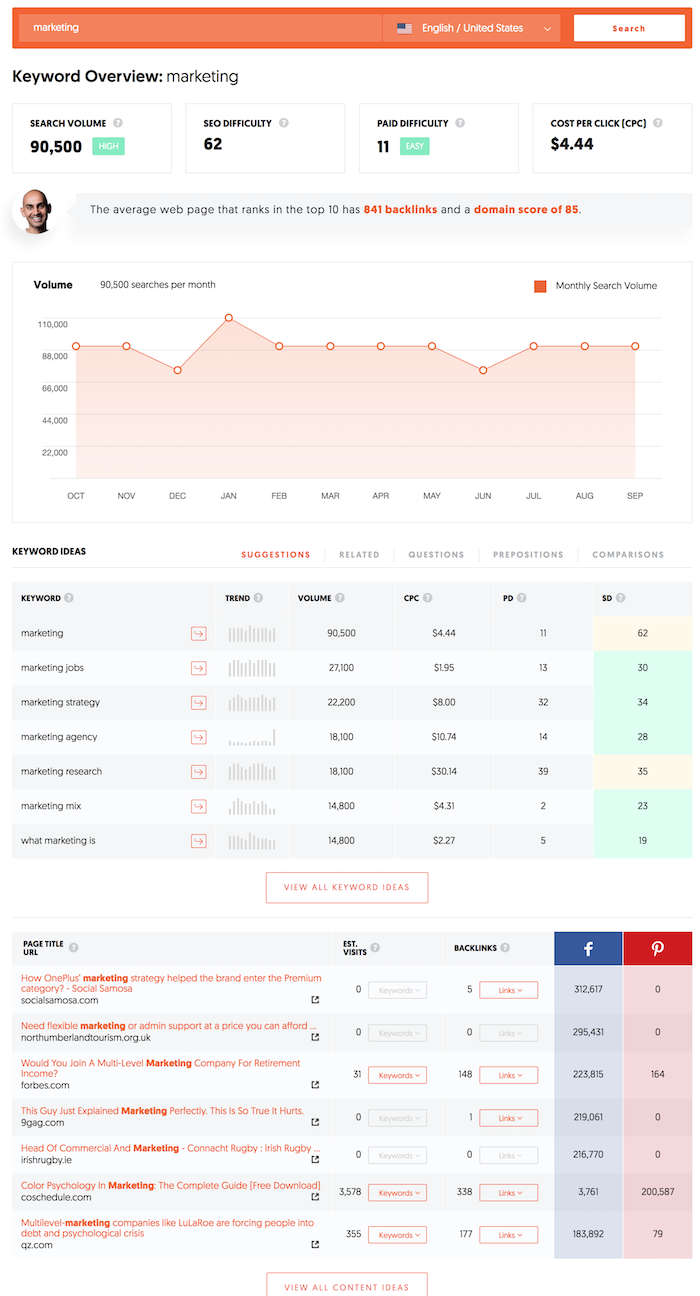
Then as you scroll down, in the keywords ideas table you’ll see tabs for questions, prepositions, and comparisons.
I want you to click on the “view all keyword ideas”.
You’ll now be taken to the keyword ideas report that looks like this:
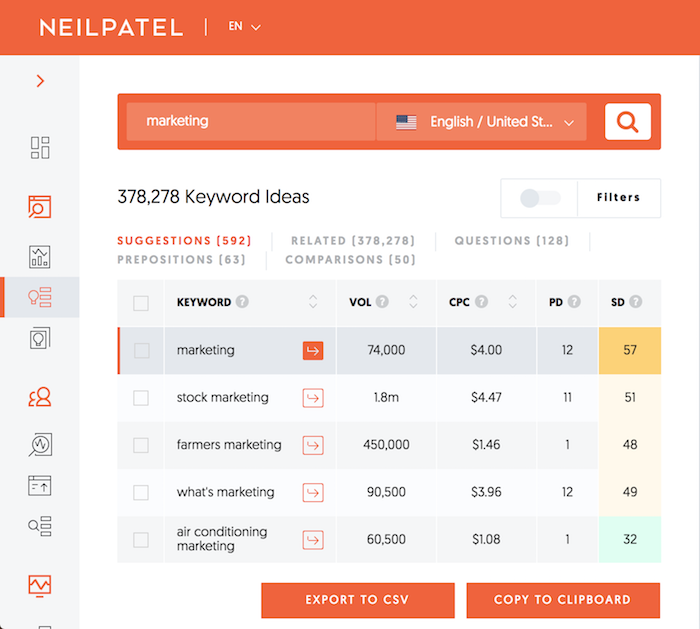
Now, click on the tab labeled “questions”. It will adjust the keyword recommendations to show you all of the popular questions related to the main keyword you just researched.

You’ll then see some suggestions that you could consider going after. Such as:
- Why is marketing important?
- What marketing does?
- How marketing works?
But as you scroll down, you’ll find more specific questions such as:
- Why a marketing plan is important?
- How marketing and sales work together?
- How many marketing emails should you send?
Now that you are able to see these questions people are typing, in theory, you can easily rank for them as most of them have an SEO difficulty score of 20 or so out of a 100 (the higher the number the more competitive it is).
More importantly, though, you can create content around all of those phrases and sell people to your product or service.
For example, if you created an article on “why a marketing plan is important,” you can go into how you also can create a marketing plan. From there you can transition into describing your services on creating a marketing plan and how people can contact you if they want your help or expertise in creating one.
You can do something similar with the “how marketing and sales work together” article in which you can break down how to make each department work together. From there, you can either be an affiliate for software solutions that help merge the two departments like HubSpot or sell your own software if you offer one. You can even pitch your consulting services that help tie sales and marketing together.
And as for the “how many marketing emails should you send,” you can create content around that and have an affiliate link to popular email tools that have high deliverability and offer automation. Or you can promote your own email product.
Now imagine all of the extra keywords you can rank for by going after question-related keywords. What’s amazing about this is most of these keywords are competitive and they have extremely high search intent.
Can it get any better?
Speaking of search intent, I want you to click on the comparisons tab.
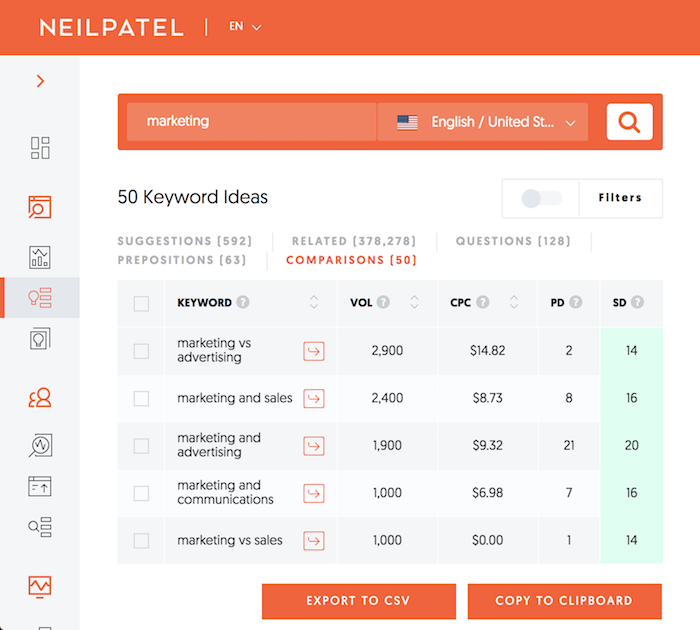
You’ll see a list of ideas just like you did with the questions tab. But what I love doing here is typing in a competitor’s brand name here.
Let’s say I am offering an email marketing tool. I could type in “Mailchimp” and see what comparison ideas Ubersuggest comes up with.

Now for this example, I want you to imagine that you have an email company called Drip and Drip isn’t really mentioned in any of these keyword comparison ideas.
What’ll you want to do is create articles on all of the popular comparison terms like “Mailchimp vs Constant Contact” or “Mailchimp vs Convertkit” and within those articles break down the differences and also compare them with your own tool Drip.
Be honest when writing the comparisons. Show off which is the best solution using facts and data and break down how you are different and in what ways your own solution is better than the two solutions the reader is comparing.
This will bring awareness to your solution and you’ll find that people will start purchasing it even though they were comparing two of your competitors.
If you want a good example of how to create a neutral comparison type of blog post, check out this article comparing web hosts.
And if you want to take it one step further, you can click on the “prepositions” tab to find even more ideas.
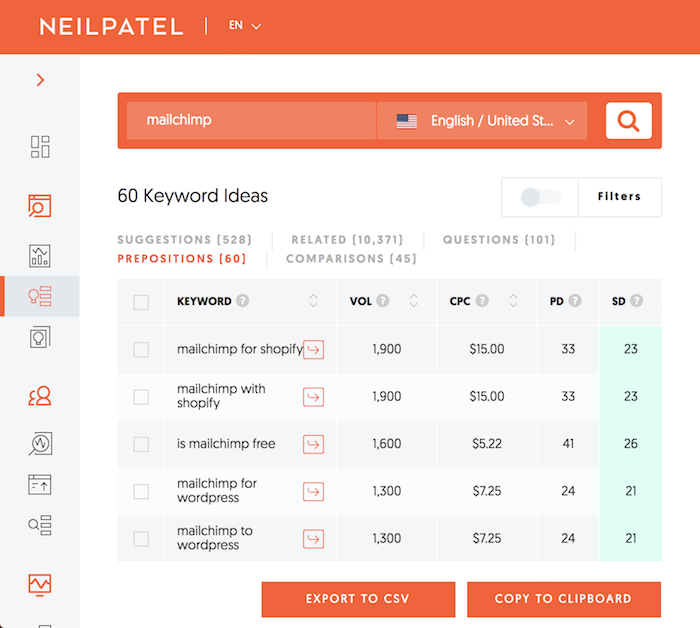
Sticking with the Mailchimp example, you can see that people are curious about Shopify and WordPress integrations.
You can write articles related to integrations and also push your own product and break down how it differs from the others.
If you want to take it one level deeper, it will give you ideas on how to modify your business. For example, if I created an email marketing tool, I would create a Shopify, WordPress, Woocomerce, and Squarespace integration based on the ideas I got from the prepositions tab.
So how did I rank for 636,363 keywords?
I didn’t use all of the examples above on NeilPatel.com because I am not really trying to sell a product and I don’t have the time to write thousands of new blog posts.
But I did type in my domain name into Ubersuggest and then headed over to the top pages report.
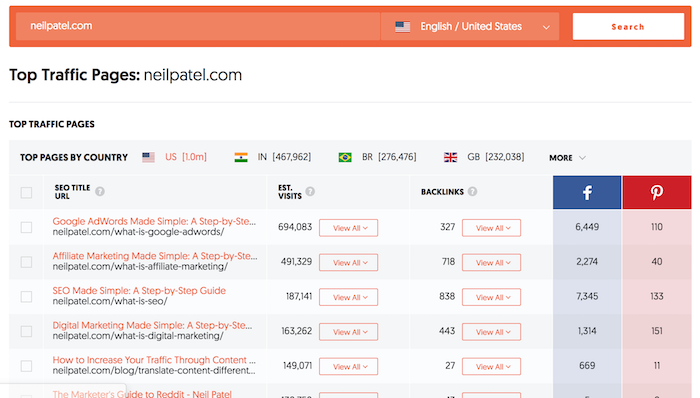
From there I looked at the pages that are already ranking well on Google and clicked on the “view all” button to see the exact keywords each page ranks for.
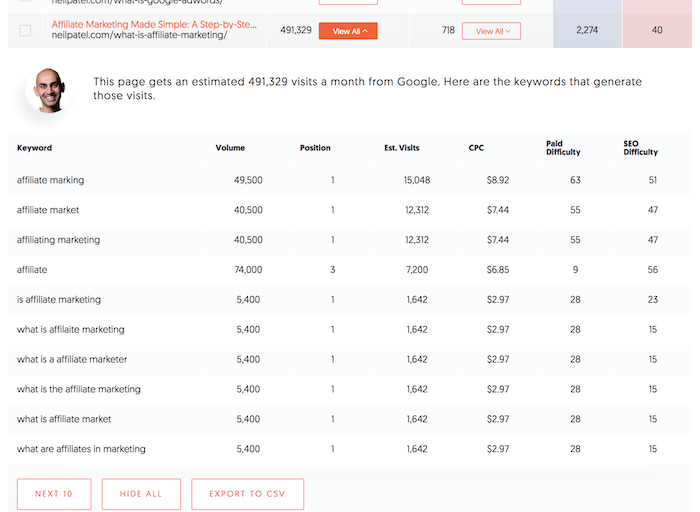
As you can see from that page I rank for questions like “what is affiliate marketing” as well as popular prepositions and comparisons.
How did I do this?
Well, that top pages report shows you keywords each of your pages already ranks for. So all you have to do is research each of those terms through Ubersuggest and find popular questions, prepositions, and comparisons.
Conclusion
The natural instinct for any SEO or marketer is to rank for popular terms that have a lot of search traffic.
But there is an issue with that strategy. It takes a lot of time, it’s extremely competitive, and many of those search phrases don’t cause a ton of conversions as they are super generic.
So, what should you do instead?
Focus on solving people’s problems. The way you do this is by creating content around the questions, prepositions, and comparisons people are searching for in Google.
What do you think about the new Ubersuggest feature?
The post How I Ranked For 636,363 Keywords Using This Simple Hack appeared first on Neil Patel.
from Blog – Neil Patel https://ift.tt/2lahe2w

No comments:
Post a Comment